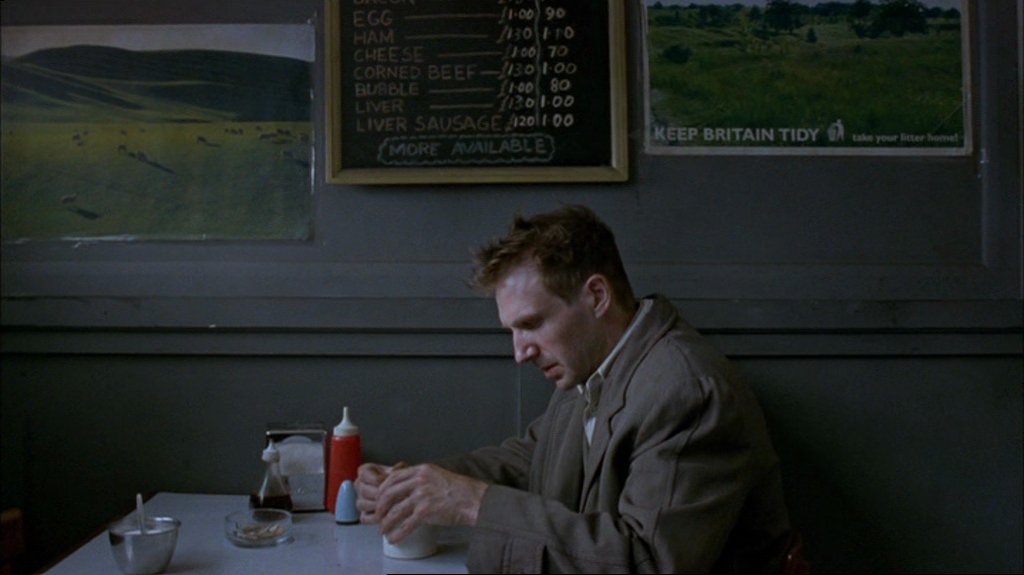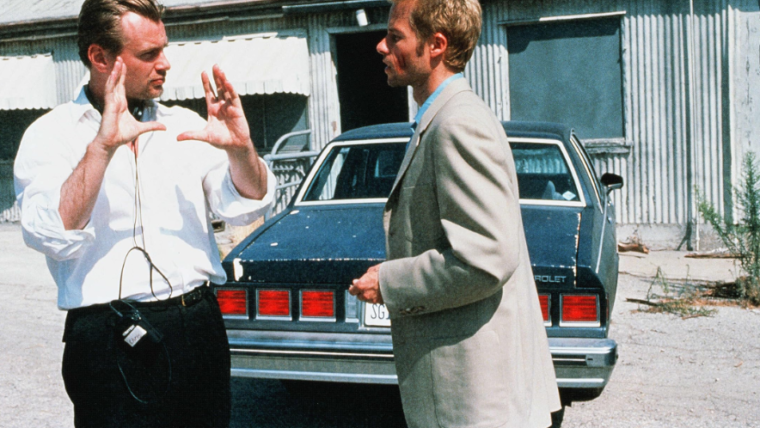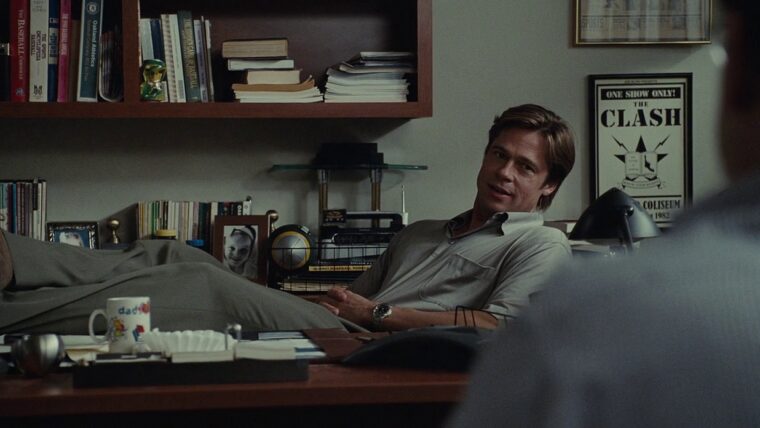Interviewer
You once said something like this. Make a film to find out why you want to make it.
David Cronenberg
Yes, yes, that’s right. Because the choice of the material is always very intuitive. I’ve been talking to a lot of journalists, and they all seem to think that you do it the way they do, analysis of your career. There’s the arc that began with scanners and then comes down to here. It’s nothing like that. It’s all intuitive. You don’t really know why you want to do it.
Interviewer
But you feel it.
David Cronenberg
You feel very strongly that you will be destitute if you don’t do this movie.
Interviewer
Why did you feel that about McGrath novel?
David Cronenberg
Well, it wasn’t really the novel because I got the script first and I got Ralph first and I know that the script came with a letter that said Ralph Fiennes wants to do this movie and it was very convincing letter from his agency and so right from the beginning, that was an attraction because I don’t think I would have read the script because I didn’t know the guy was coming to me from, unless it had that letter.
Interviewer
And so, you read the script because Ralph’s name was attached to it?
David Cronenberg
That’s correct. And I didn’t know Patrick’s writing at that time.
Interviewer (to Ralph Fiennes)
So, you’d agree to do this not known who is going to direct, but with some kind of veto over who they might choose?
Ralph Fiennes
Well, Catherine Bailey, who produced this film, who developed it with Patrick McGrath, who wrote the novel, and the screenplay approached me. She produces radio plays in fact, and she was watching me doing a radio play and she gave me the script saying, “I think you would be good in this role”. And I loved it. People asked me why, but I didn’t know why. I just responded instinctively or intuitively to the atmosphere of the script.
Interviewer
What does atmosphere mean?
Ralph Fiennes
The mood, the tone, the feeling that I got from it. A spare atmosphere of this lone figure in this very empty, poor area of London.
Interviewer
And when you heard David Cronenberg was going to direct it, that he was interested because you were in.
Ralph Fiennes
I instinctively felt that that would be a wonderful choice.
Interviewer
An appropriate, proper interesting mix.
Ralph Fiennes
Yes, and both Catherine and I were very excited when David came to meet us because we didn’t know him until we met.
David Cronenberg
We had to face each other and smell each other, check each other out.
Ralph Fiennes
I was kind of nervous.
David Cronenberg
But when I saw that you were nervous, I became much less nervous.
Interviewer
You were nervous because?
Ralph Fiennes
I get asked all the time by journalists and people what’s David Cronenberg like? What’s he like exactly? Cause they imagine from the films that he’s some weird and freaky guy.
Interviewer
It is this notion that you have, that you are imagined to be this weird? What is the misconception about you?
David Cronenberg
I don’t want to get too high principle about it, but I think the relationship of any artist to his art is quite a complex one, to the extent that when Marty Scorsese met me, he confessed that he was afraid of me, and I said, “You made taxi driver and you’re afraid to meet me?”. So even the artists themselves can confuse the work with the person.
Interviewer
But what do you think the perception is?
David Cronenberg
Oh, that I must be very strange and depressed, and deranged, and perverse. And I would love to be all those things, cause I’d be so much more interesting. But in fact, no. It’s why I’m drawn to those things and why those things come out. I don’t know whether it’s really a balance thing. Often you do things on screen that you don’t want to be in your life, that is certainly true.
Interviewer
OK, tell me the story, David, what are we talking about in Spider?
David Cronenberg
Well, we’re talking about a man who descends from the train. And obviously something is wrong with him because the the way he moves and the way he thinks in his confusion and stuff. And we learn that he’s been released from an asylum where he was held for something we don’t know for quite a long time. And he’s released back into society and he goes to a halfway house run by Mrs. Wilkinson, who’s played by Lynn Redgrave, and in that house are a lot of other sort of castaway, sort of social outcasts, who also have been released from various asylums, we assume. And what happens to Spider, this character, is that coming back into a London that he used to know, starts to release all kinds of memories in him, which he then kind of inhabits himself physically. He’s present in his own memory. He’s trying to put together that those incidents in his life that ended in his being institutionalized.
Interviewer
Basically, role type. This is the first scene in which Dennis Spider checks into a halfway house run by Mrs. Wilkinson, as David said, played by Lynn.
David Cronenberg
Well, the novel actually is Spider’s Journal. In fact, in the novel, Spider writes the novel and that means that he’s a beautiful writer and very articulate. And of course, very good with words and metaphor and all of those things that language entails. Whereas the screenplay that Patrick presented me to was that Spider that we’ve just seen, inarticulate and not good with words. But there were some vestiges of the novel still left in the first draft of the screenplay and it’s a classic for a novelist that he had some readings of his novel as voice overs. That Spider would write in his journal, but we would hear him reading what he was writing, and it was from the novel. And I said “Look, Patrick, you’ve got two separate Spiders here. The one you’ve created for the screen not only could not articulate those thoughts but could not even speak those thoughts. So you’ve got to forget about the novel, and let’s go with this new Spider that you’ve created so brilliantly. Sometimes you have to betray the novel to be faithful to it. That’s what I’ve discovered. There’s no dictionary for a translation. The two media are so completely different.
Interviewer
This also almost goes back to the what you said at the beginning is that you don’t know why you want to make a film until you make it.
David Cronenberg
Yes, that’s right. That’s right. Ralph was involved in the project for about four or five years before I was. People have asked me, “Did he have it all worked out in his head what Spider was going to do?” And I said “No, we’re all waiting for friends to play on our sandbox”. You know, we need collaborators, and we need to start working on thousands of details to sort of create everything.
Ralph Fiennes
Cathrine organized reading of the play with some actors. It was always odd that even not the in voice over as well as certain dialogue of Spider there was too articulate about himself. And people have said to me, “Do you find it hard not having a lot of words?”. And somehow with this character it seemed right. As soon as I was near to saying something, unless it was going to be seriously written and thought about, it felt wrong. It just felt that this is like he’s repressing language himself, feels better than if he’s being able to talk.
David Cronenberg
The language that Spider speaks in this movie is body language, basically. And when Ralph started to do this mumbling, which wasn’t in the script, he said “My God, you know, is that all right?”. And I said, “Yeah, I think it’s great” because it’s not verbalization, it’s, it’s vocalization, sort of the the vocal version of body language. And it just adds texture to it, but it’s not really adding words.
Interviewer
Tell me how you went about figuring out how you’re going to get inside the head of Spider. Did you talk to people? Did you read about schizophrenia? Did you go to visit an asylum?
Ralph Fiennes
David was always very clear that he didn’t want to be, as it were, circumscribed by being thought he was making a film accurately about schizophrenia which is complicated and big. And I think that was absolutely right, but I felt as the actor I wanted just to have some knowledge, and actually meet people who are afflicted with it. And then I I did manage to meet some people who agreed to me knowing they were together enough for themselves to be able to know that I was an actor, going to portray schizophrenic. And it was very, very moving to meet these people and they talk very openly about, you know, hallucinations, delusions. What it was like. Some of them were able to have families and have jobs. I met some that were clearly more extremely afflicted. In terms of, you know, being able to speak, talk, work much more inhibited. I didn’t base Spider on any particular person, but it gave me a few pointers. Also talking to doctors and psychiatrists who worked with schizophrenia. I was asking them about the behaviors, little twitches, spasms, which some of them have and one of them said me “There are people to the naked eye could be completely normal, and they may be hearing voices or having sensations which they wouldn’t reveal to you. And they’ll be able to carry on normally, and other people who are clearly to the naked eye, very badly upset.” He said to me “You can do you sort of what you want. There isn’t one way any schizophrenic behave. There isn’t one particular way of behaving.” We discussed the degrees to which it could become too affected or too busy and I was always anxious it would get, too much. I remember, I was always asking David “Is that too much? Should I do more?” And I needed David to be appointed to guide me on.
Interviewer
You didn’t like Beautiful Mind?
David Cronenberg
Well, I don’t really like to criticize other people’s movies, but it did come up because it was like the Hollywood version of schizophrenia and that’s basically why and certainly it worked for people. But what a great version of schizophrenia. And he has a movie made about him that wins Oscars. And he has a relationship with a beautiful woman. And people would say, well, if that’s schizophrenia, I want it.
Interviewer
Yeah. Yes.
David Cronenberg
I’ve actually talked to two journalists today. One said that his brother was schizophrenic and one said that her mother was schizophrenic, and they found the movie incredibly moving, touching and accurate. And they both didn’t like and had disdain for Beautiful Mind.
Interviewer
So, you want people to come away with them other than enjoying it as a cinematic experience?
David Cronenberg
Well, see, this is the thing, when I said to Ralph, look, you can please do research, because of course you’ll find things that you could use. But I’m interested in the human condition. I’m doing a clinical study of the human condition, not of a disease.
Interviewer
Exactly, I know. What you mean?
David Cronenberg
And so, I wanted to have the freedom to not worry about what the Schizophrenia Society of Canada would think, for example. Even though they wrote me a nasty letter because of something they read on the Internet, of course they hadn’t seen the movie. For example, after a screening, a woman came to me and she said, “How did you know about the bathtub?” And I said, “What do you mean?”. She said, “Well, I have one of those at home. My son, he’s 23. He’s 6 foot four and he is schizophrenic. And when he takes a bath, that’s exactly how he lies in the bath. That’s how he holds himself, that’s how he mutters to himself.” And she said, “You must have done research.” And I said, “The script that says Spider lies in the bathtub.” And I said, “It’s Ralph”. It’s my sense of the lighting and the camera move and the music that Howard Shore composed for it. Very delicate, that really takes you inside the mind without being sort of didactic about it.



